Connecting the Dots
(Canada, 54 min.)
Dir. Noemí Weis
Spending an hour listening to stories about pain, despair, loneliness, and depression might not be atop everyone’s list during this pandemic. Everyone is feeling down and alone, and there seems to be no light at the end of the social distancing tunnel. Between the high-level anxiety caused by coronavirus and ensuing lockdowns, the stressful images (and even more stressful reality) of systemic racism and protests in response to it, and the crazy train of Donald Trump, this year hasn’t been easy. (Let’s not even add the stress of keeping up with the film release/festival calendar, which is like a 24/7 game of Whack-a-Mole that moves at 100 km/h.) However, when experts say that the COVID-19 pandemic ‘will be the most psychologically toxic disaster in anyone’s lifetime,’ conversations about mental health are of the utmost importance.
Noemí Weis (Milk) invites this conversation through her new documentary Connecting the Dots. The film offers a global and intersectional portrait of contemporary youths discussing issues of mental health. From Toronto, Canada to Harare, Zimbabwe, Weis gives voice to young people from a variety of backgrounds. The film features numerous speakers in confessional interviews, shot like iPhone video TikToks and Instagram stories to capture the means through which Millennials share their experiences and amplify their voices. These stories speak of hopelessness and alienation, but also strength and resilience as the speakers convey how they get through the day-to-day. In many cases, it’s simply a matter of having an outlet where they can speak candidly. Said outlet can be a friend with an empathetic ear or a video live-streamed to anonymous listeners worldwide.
Connecting the Dots features a constant presence with Nathan Harmon, a motivational speaker for Your Life Speaks. Decked out in jeans and a man-bun, Nathan offers an accessible figure to whom the students relate. He’s young enough to be approachable and understand their experiences, but mature enough to convey his stories with authority. One powerful scene sees the speaker in his element, captivating an audience full of students. He asks anyone to raise their hands if they, or someone they know, has had thoughts of suicide or self-harm. Virtually all the hands shoot up, indicating that the kids aren’t all right, but recognize the importance of mental health. As he travels the globe and listens to the students, he reminds them, and viewers at home, that they are not alone in their struggles.
The doc touches upon a variety of subjects that influence the mental well-being of youths worldwide. Connecting the Dots raises issues of systemic racism, social mobility, homophobia, cyberbullying, and the stigma associated with mental illness. The doc conveys how today’s youths are more open to having these conversations while their parents and grandparents largely saw mental illness as something to be hidden away.
In raising so many topics across a 54-minute film while travelling the globe and (admirably) giving airtime to so many speakers, the doc admittedly has more dots than connective tissue. At times, it can be a slick montage of buzzword soup as Nathan jogs with one person while chatting about healthy eating and then ascends some picturesque hills in Phoenix as aerial shots observing him in conversation with a fellow guru. However, Connecting the Dots is all about the power of conversation and its ability to heal. The doc invites audiences to continue the dialogue and reach out to a friend in need.
Connecting the Dots screens virtually Nov. 19. Visit the film’s website for updates.











